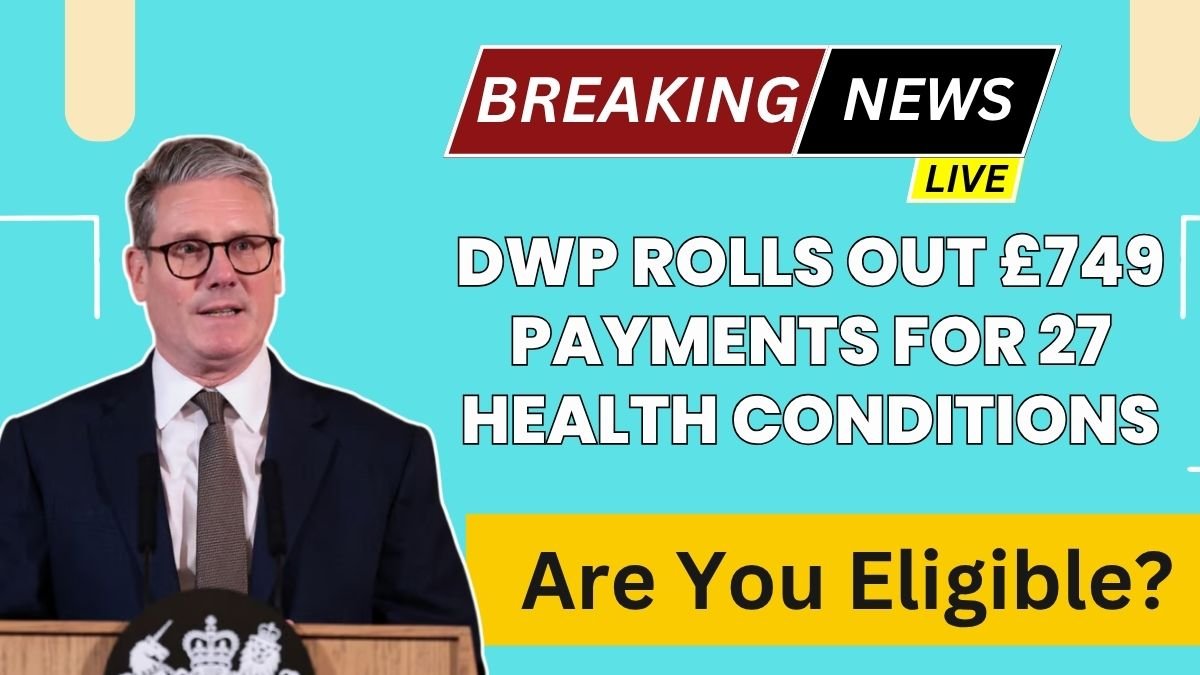If you’re living with a long-term health condition or disability and are struggling to make ends meet, you might be entitled to a helpful one-time payment that can ease some of the financial stress. The Department for Work and Pensions (DWP) has announced a £749 payment for certain individuals, and if you’re already receiving Personal Independence Payment (PIP) or planning to apply, this update is worth your attention.
Let’s walk through what this payment is all about, who qualifies, how it works, and what steps you can take to apply. We’ll also break things down in a clear, friendly way, so you know exactly where you stand and what to do next.
What Is the £749 Payment?
This isn’t a standard monthly benefit or a new ongoing scheme. It’s a one-off payment of £749, designed to support individuals with certain health conditions who face extra challenges in daily living or getting around. The DWP has tied this payment to Personal Independence Payment (PIP), a benefit for people who have difficulties with daily tasks or mobility because of a disability or long-term illness.
So, if you already receive PIP, or you’re about to apply, this payment could be something you’re eligible for—but it depends on your individual needs and circumstances.
Who Might Be Eligible?

To determine eligibility, the DWP has listed 27 medical conditions that could make someone eligible for the one-off £749. These conditions span several categories:
- Respiratory illnesses: Conditions like Chronic Obstructive Pulmonary Disease (COPD), asthma, or pulmonary fibrosis. These illnesses often affect breathing and physical endurance.
- Neurological disorders: Epilepsy is a prime example here, where seizures may impact daily functioning or safety.
- Chronic or infectious diseases: Conditions such as pneumonia or sarcoidosis that significantly affect physical health.
- Occupational lung diseases: These include long-term illnesses caused by workplace exposure, such as asbestosis or silicosis.
- Organ-related conditions: For example, those who have undergone major procedures like heart or lung transplantation.
But just having one of these health issues isn’t enough. What really matters is how your condition affects your ability to live independently.
Understanding PIP and the Role It Plays
To receive the £749, you must either already be receiving PIP or be eligible for it. PIP is assessed based on two key areas:
- Daily Living Activities: Can you manage personal care like bathing, eating, dressing, preparing meals, or managing medication?
- Mobility: Do you have difficulty walking, using public transport, or navigating unfamiliar places?
During a PIP assessment, a health professional evaluates the extent to which your condition limits your independence in these areas. This assessment is critical in determining whether you qualify for the additional £749 payment.
PIP Rates (2025 Figures)
PIP itself comes in two parts, each with a standard and enhanced rate:
- Daily Living Component:
- Standard Rate: £61.85/week
- Enhanced Rate: £110.40/week
- Mobility Component:
- Standard Rate: £24.45/week
- Enhanced Rate: £64.50/week
If you are assessed as needing help in both daily living and mobility, particularly at the enhanced rate, this may make you eligible for the extra £749 support.
How to Apply for PIP and Claim the £749 Payment
If you think you might qualify, here’s a simple step-by-step guide to follow:
- Check Your Condition: See if your illness or disability falls under the DWP’s list of 27 conditions. Even if your specific diagnosis isn’t named, you might still qualify if the effects are similar.
- Gather Medical Evidence: Collect documents like doctor’s letters, diagnosis reports, treatment summaries, and hospital discharge notes. This evidence will support your claim.
- Apply for PIP: You can apply online at gov.uk/pip or request a paper form. If you need help filling it out, organizations like Citizens Advice can assist.
- Prepare for the Assessment: The DWP may ask for a phone interview or face-to-face consultation. Be honest about your struggles—describe your bad days, not just your good ones.
- Wait for a Decision: After the assessment, you’ll receive a letter with the decision. If you qualify for both enhanced components, you may also receive the £749 payment.
Payment Timing and Updates
Why was the £749 paid early in some cases? Due to the May Bank Holiday, the DWP issued early payments to avoid delays. Instead of the usual May 26 schedule, some recipients received their money on May 23. If you had an upcoming PIP review or recently completed an assessment around that time, check your bank—you may already have the funds.
Real-Life Example
Let’s say you know someone like John, a retired warehouse worker who developed COPD after years of exposure to dust and chemicals. Climbing stairs became impossible. Going to the shops unaided wasn’t an option. John applied for PIP and, based on his limited mobility and difficulty managing daily tasks, was awarded the enhanced rate for both components. As a result, he not only received regular payments but also qualified for the £749 one-off payment, which helped him buy a mobility scooter and pay for extra home care support.
Additional Support You Might Be Eligible For

The good news is that this one-time payment isn’t the only support available. You might also qualify for:
- ESA (Employment and Support Allowance): If you can’t work because of your condition.
- Universal Credit: For those with limited income or job prospects, especially if combined with health limitations.
- Disability Living Allowance (DLA): For children under 16 who have care or mobility needs.
- Carer’s Allowance: If someone provides regular care for you.
All of these can provide valuable help, depending on your individual circumstances.
Where to Get Help
Applying for disability benefits can feel overwhelming, especially when dealing with a serious health issue. Thankfully, there are plenty of organizations that can help, including:
- Citizens Advice: Free benefit guidance and help with applications.
- Disability Rights UK: Offers accessible guides and helplines.
- Local Welfare Support Teams: Often run by councils or charities, they can assist with paperwork and appeals.
Final Thoughts
Living with a chronic condition or disability is challenging enough without the added stress of financial worries. This £749 payment from the DWP is one way to ease the burden and make life a bit more manageable.
If you think you might be eligible, don’t wait. Take that first step today: check your condition, gather your paperwork, and start the PIP application. It could make a real difference in your life or the life of someone you care about.
FAQs
Q1. What is the £749 payment from the DWP?
A: The Department for Work and Pensions (DWP) is offering a one-time payment of up to £749 for individuals suffering from one of 27 qualifying health conditions under benefits like Personal Independence Payment (PIP) or Attendance Allowance.
Q2. Can I get this payment if I already receive Universal Credit?
A: Yes, if you meet the disability or health condition criteria, you may be eligible for this payment in addition to Universal Credit.
Q3. Will receiving this payment affect my other benefits?
A: No, in most cases, PIP and Attendance Allowance are non-means-tested, meaning they won’t reduce your other benefits or income-based support.
Q4. Is this a one-off payment or a regular benefit?
A: This is a lump-sum payment provided to eligible claimants. However, if you continue to meet eligibility, you may receive regular support under PIP or similar programs.
Q5. How do I apply for this payment?
A: You can apply through the Personal Independence Payment (PIP) process by contacting DWP directly or visiting GOV.UK. If you are already receiving certain benefits, you may be automatically considered.


